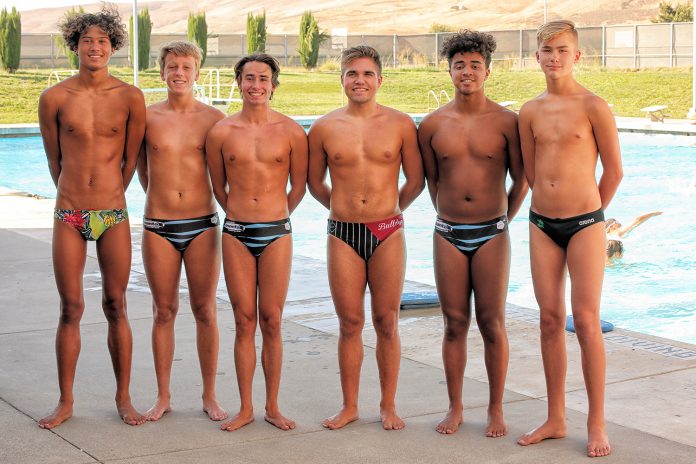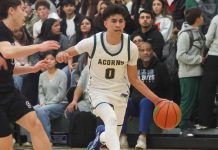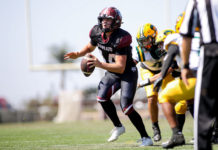
The Manta water polo program had their best showing ever in the Junior Olympics in July in Irvine, as their 16-and-under team finished 17th and their 18-and-under squad placed 21st in the championship/top bracket of the Silver Division. It was a monumental achievement for Manta, which had both of their teams improve on their seeding by 10 to 12 positions. Manta coaches Ronni Gautschi and Doug Pickford could not have been prouder of this year’s group of players.
“Just like with the 18U team, the 16U team continues to improve in numbers and continues to improve their standing within the Junior Olympic structure,” said Pickford, who is in his second year coaching the 16U squad. “As a program, you definitely can’t ask for much more than that. We’re definitely on a very positive trajectory.”
Said Gautschi: “This was a huge impact (for the program). From being barely invited to Junior Olympics to holding our own and doing well there, it’s just a different feeling, a feeling that we’re on the rise.”
The 18U roster included Colin Edgar, Stephen Parker, Max Klein, Chris Critzer, Cameron Storlie, Nolan Ciccone, Ismael Gonzalez, Alex Swenson, Adam Thompson, Jake Mendes and Nate Cazares. The 16U team included Lucas Bissell, Jacob Demare, Jacob Muncy, Andrew Hitchcock, Nicholas Jensen, Jacob Hatch, Andrew Newberg, Alex Portera, Michael Seery, Chase Gavin, Race Thompson, Alec Gallardo and Derik Lawing. Dawn Wilson served as an assistant coach to both squads.
The Junior Olympics feature hundreds of teams from across the nation, including all of the powerhouse clubs. Gautschi and her brother started Manta in 2011, and the program has been on a particularly sharp rise in the last couple of years. Manta is truly a homegrown success story. The majority of the players in the program live locally and prep at Live Oak, Gilroy, Christopher and Sobrato.
Under the leadership of Gautschi and Pickford, all signs point to Manta being a perennially strong player in the Junior Olympics for years to come. Pickford said all of the ingredients are there for the program to thrive, including reasonable fees to play, facility use and coaches who are passionate about the sport and the improvement of every individual.
Indeed, Gautschi has received rave reviews from players over the years for being a demanding yet fair coach. Both she and Pickford are straight shooters, so players don’t have to guess as to what is expected out of them. Their synergy continually provides the program with energy, which the players feed off of. Pickford said Gautschi has done an outstanding job of also focusing on the next generation of players, as that is key for a program to achieve sustained success.
“Ronni has done a great job creating enthusiasm from the younger players,” Pickford said. “By the time they’re in the seventh grade, they know their path in athletics is playing water polo in high school. … For us Manta continues to evolve in that we’re not about trying to promote or enable one single high school. Ronni and I look at this as improving the (entire South Valley) area for water polo.
“We have a number of club players from Live Oak, Christopher, Gilroy and Sobrato. As those programs flourish and we are a point of connectivity to those high school teams, we draw more and more kids who want to play at a higher level into the Manta program and help those high school programs at the same time. We’re trying to improve that entire cycle between high school play and club play and get players to play year-round or mostly year-round. When that happens, it becomes kind of a self-sustaining evolution of how a program grows.”
For Gautschi, the emphasis is on the process of player development, knowing that if Manta continues to do that in a productive way, the program will excel not just in numbers but on the scoreboard.
“I want Manta to be a strong team, but not to the point where you have 100 kids on a team,” she said. “You can have 100 kids on the big clubs and maybe 15 of them get to play. That is crazy to me. I will never put my kids in a situation where there are thousands of them and a lot of kids are not able to play. I want everyone to play, and we want to strengthen water polo in our area and get kids to play and not just have the best of the best. We want to grow our area and stop people traveling an hour and a half north. We want to give them the option to play (club water polo) here.”
Gautschi and Pickford said they truly enjoyed coaching their respective teams, noting how the 16U squad overcame some potentially inner turmoil to achieve a true team performance. Led by Hatch, Hitchcock and Jensen, the coaches noted how the team was over reliant on the three standout talents. When that happens, Pickford said, the other players are less engaged and tend to be bystanders rather than participants.
“And then you get into tough games, the other team can figure that out pretty quickly, and we become a pretty easy team to beat,” Pickford said. “There was a point in the season where we had that situation, and that dynamic was providing some negative energy if you will. We sat down as a group and talked it through that if we wanted to be a better team, we needed everybody to step up. Everybody was on board, stuck with it and hung in there.”
“One thing we emphasized was not relying on those two to do everything,” Gautschi said. “And I think the boys did that because you had others realize they were good enough to step up and make a difference.”
Hatch, Hitchcock and Jensen had their usual superb performances at the Junior Olympics; however, it was the elevated play of their teammates and the improved cohesion that made the tournament run worthwhile.
“I can say in all honesty we played as a team,” Pickford said. “We won or lost as a team, the chemistry was spectacular and as a coach you can look at the end of the day and say that is what victory is. That was the story of our season—overcoming the negative energy and negative chemistry and turning that into a an absolutely positive result at the end.”
Hatch and Hitchcock powered the 16U team; however, Gautschi said she was most proud of the fact that other players also stepped up, making for a true team performance.
“One thing we emphasized was not relying on those two to do everything,” she said. “And I think the boys did that because you had others realize they were good enough to step up and make a difference.”
Gautschi has coached dozens of teams over the years, but there was something truly special about the 18s squad this season. Critzer and Ciccone played with tremendous chemistry; Cazares blocked several 5-meter shots; Mendes made huge improvements in his shotmaking; Edgar, with his long arms, made a huge impact defensively; Klein put some strong shots on goal; Parker displayed an indefatigable work ethic; and Thompson was clutch in a shootout.
“The 18s team was probably the most favorite team I’ve ever coached,” Gautschi said. “Seeing them with Hudson (Gautschi’s 19-month-old son) and how they interacted with him just melted my heart. It was the coolest group of boys I’ve coached in a long time. I cried (when the season was over) and I’m not much of a crier. The entire group cried, actually, because even though it was sad things came to an end, I’m always going to think they’ll be a part of Manta in some fashion.”







